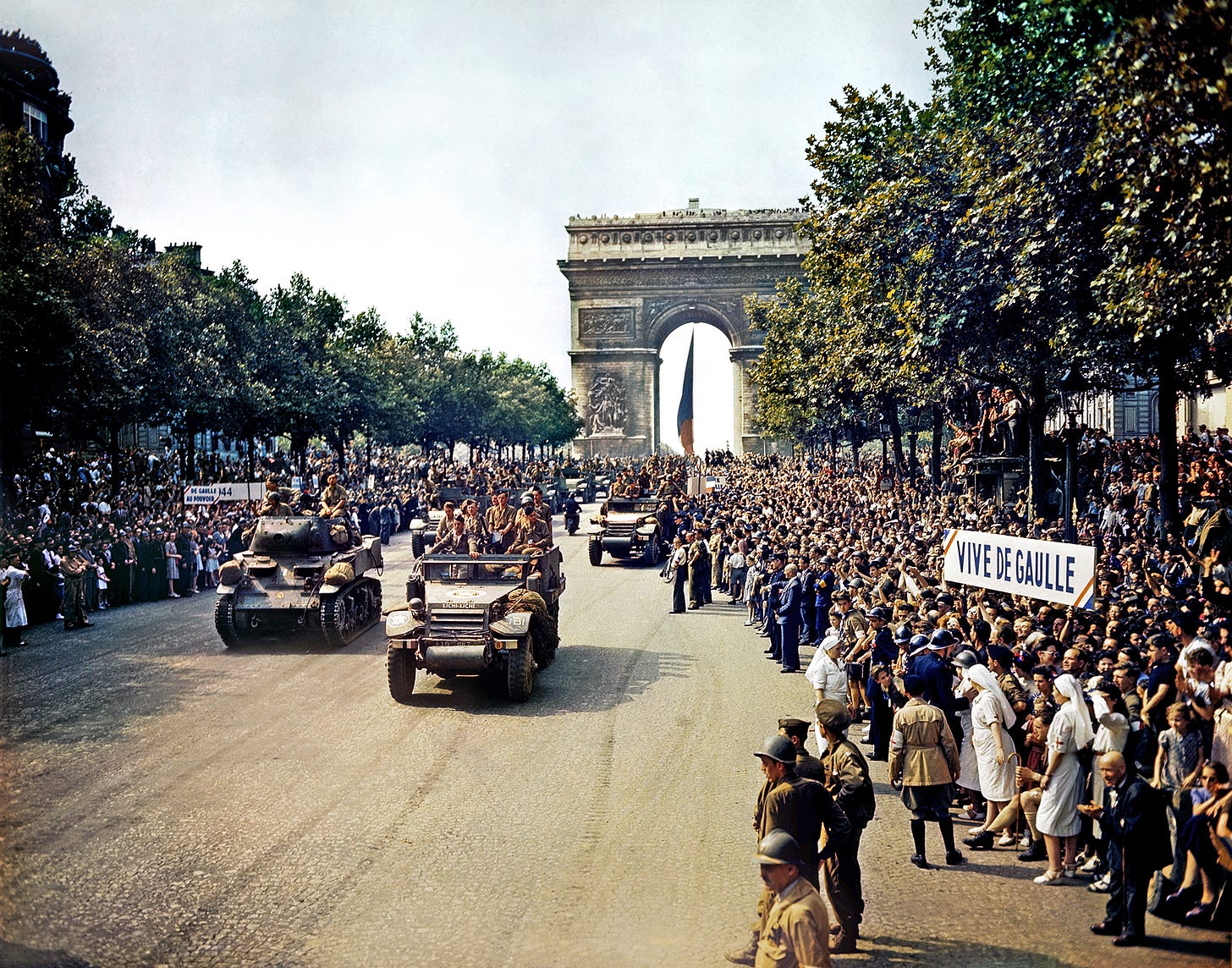On This Day in 1944: The Unbreakable Spirit That Liberated Paris
The day France reclaimed its soul from Nazi occupation and betrayal.
France’s Soul Reclaimed
The date 25 August 1944 lives in defiance. It wasn’t merely a military victory. It was France, bruised and humiliated, hauling itself up from beneath the jackboot of Nazi occupation. Paris, so often reduced to postcard elegance, had been gagged and trampled by tyranny for four long years. Its liberation was not a gift bestowed from abroad. It was the climactic crescendo of a slow-burning French uprising; stubborn, secretive and soaked in sacrifice.
The history of that day is not one of parades and protocol. It is a history etched in quiet rooms, bloodied barns, and the backstreets where whispers did the work of rifles. It is the story of those who chose to resist not just the Germans, but the betrayal of their own government.
France Betrayed, Then France Chose
When Marshal Pétain, the doddering icon of the First World War, surrendered to Hitler in 1940, he didn't just concede militarily. He handed over the moral integrity of France, embalming it in the formaldehyde of collaboration. With Paris overrun and Vichy in place, many resigned themselves to this new arrangement, cloaking cowardice in the robes of realism.
But others, men like Jean Moulin and the exiled Charles de Gaulle, saw through the veneer. They understood that true patriotism sometimes means disobedience. They rejected the Vichy lie that survival meant silence. Instead, they reimagined what it meant to be French: not to obey, but to resist.
De Gaulle's escape from France in 1940 wasn’t desertion. It was strategy. He recognised that France could not win from within if its institutions were rotting. The voice he projected from London, telling the French that “the flame of resistance must not be extinguished,” was no empty slogan. It was the match that lit the fuse.
Jean Moulin: The Martyr Who Made Unity Possible
Much of that flame would have flickered out had it not been for Jean Moulin. Here was a civil servant who defied fascism not with slogans but with scars. After refusing to sign a Nazi-forged document framing Senegalese soldiers for war crimes, he slashed his own throat with a shard of glass to protect the truth.
He survived. And what followed was no second life, but the beginning of his real work. Travelling across France in scarves and shadows, Moulin unified the fractured partisan groups, persuading them to fight not as isolated cells but as one body, the Conseil National de la Résistance.
He did this while the Gestapo closed in, using every contact, every false name, every ounce of cunning to turn resistance from a desperate impulse into a strategic weapon. And yet, betrayal lurked within. Arrested in Lyon in 1943 due to a suspected informant, Moulin endured three weeks of brutal torture under Klaus Barbie, the infamous “Butcher of Lyon.” He said nothing. He died silently in German custody, but his voice echoed louder than ever.
He was the architect of resistance, but not its saviour. That role remained with the many, nameless men and women who risked everything to print newspapers, blow up railway lines and hide fugitives in cellars.
De Gaulle’s Gamble Pays Off
While Moulin perished in France, De Gaulle worked from London. His gamble was long and uncertain, trying to command legitimacy without territory, influence without arms. But when the Allies landed in Normandy in June 1944, the game changed.
There was no guarantee the Americans or British would back a French-led liberation of Paris. But Eisenhower understood the symbolic importance. This was not a city to be ‘secured.’ It had to be reclaimed by the French themselves. And so, it was Philippe Leclerc, De Gaulle’s trusted general, who led the march to Paris in August, commanding his 2nd Armoured Division through German garrisons and against Nazi resistance.
It wasn’t just strategy. It was theatre. And in war, symbolism matters. The sight of French tanks rolling into the capital was worth more than a thousand bulletins from London. The tricolore above the Eiffel Tower meant that France hadn’t merely been freed, it had freed itself.
Why August 25th Still Matters
The liberation of Paris was not the end of the war. It wasn’t even the end of fighting in France. But it was the moment France reclaimed its moral centre. It exposed the falseness of the Vichy narrative, that resistance was futile, that obedience was wise.
On this day, we remember not just a battle, but a reckoning. We remember that history doesn't just move forward through power, but through principle. That there are times when loyalty to a country means defying its leaders. That a man like Jean Moulin, who chose death over complicity, may achieve more than an army.
Today, in a world once again flirting with revisionism and forgetting, the example of 25 August 1944 grows more urgent. Liberation came not because people waited, but because they acted. Not because they were strong, but because they were right.
History may admire generals, but it remembers martyrs. And it celebrates the day when a people, long underestimated, rose up not to ask for freedom, but to take it.


